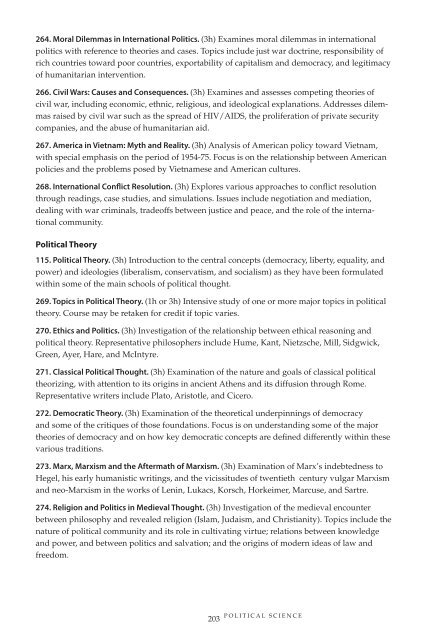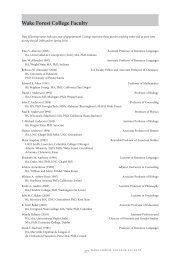theundergraduateschoo ls - Wake Forest University
theundergraduateschoo ls - Wake Forest University
theundergraduateschoo ls - Wake Forest University
You also want an ePaper? Increase the reach of your titles
YUMPU automatically turns print PDFs into web optimized ePapers that Google loves.
264. Moral Dilemmas in International Politics. (3h) Examines moral dilemmas in international<br />
politics with reference to theories and cases. Topics include just war doctrine, responsibility of<br />
rich countries toward poor countries, exportability of capitalism and democracy, and legitimacy<br />
of humanitarian intervention.<br />
266. Civil Wars: Causes and Consequences. (3h) Examines and assesses competing theories of<br />
civil war, including economic, ethnic, religious, and ideological explanations. Addresses dilemmas<br />
raised by civil war such as the spread of HIV/AIDS, the proliferation of private security<br />
companies, and the abuse of humanitarian aid.<br />
267. America in Vietnam: Myth and Reality. (3h) Analysis of American policy toward Vietnam,<br />
with special emphasis on the period of 1954-75. Focus is on the relationship between American<br />
policies and the problems posed by Vietnamese and American cultures.<br />
268. International Conflict Resolution. (3h) Explores various approaches to conflict resolution<br />
through readings, case studies, and simulations. Issues include negotiation and mediation,<br />
dealing with war crimina<strong>ls</strong>, tradeoffs between justice and peace, and the role of the international<br />
community.<br />
Political Theory<br />
115. Political Theory. (3h) Introduction to the central concepts (democracy, liberty, equality, and<br />
power) and ideologies (liberalism, conservatism, and socialism) as they have been formulated<br />
within some of the main schoo<strong>ls</strong> of political thought.<br />
269. Topics in Political Theory. (1h or 3h) Intensive study of one or more major topics in political<br />
theory. Course may be retaken for credit if topic varies.<br />
270. Ethics and Politics. (3h) Investigation of the relationship between ethical reasoning and<br />
political theory. Representative philosophers include Hume, Kant, Nietzsche, Mill, Sidgwick,<br />
Green, Ayer, Hare, and McIntyre.<br />
271. Classical Political Thought. (3h) Examination of the nature and goa<strong>ls</strong> of classical political<br />
theorizing, with attention to its origins in ancient Athens and its diffusion through Rome.<br />
Representative writers include Plato, Aristotle, and Cicero.<br />
272. Democratic Theory. (3h) Examination of the theoretical underpinnings of democracy<br />
and some of the critiques of those foundations. Focus is on understanding some of the major<br />
theories of democracy and on how key democratic concepts are defined differently within these<br />
various traditions.<br />
273. Marx, Marxism and the Aftermath of Marxism. (3h) Examination of Marx’s indebtedness to<br />
Hegel, his early humanistic writings, and the vicissitudes of twentieth century vulgar Marxism<br />
and neo-Marxism in the works of Lenin, Lukacs, Korsch, Horkeimer, Marcuse, and Sartre.<br />
274. Religion and Politics in Medieval Thought. (3h) Investigation of the medieval encounter<br />
between philosophy and revealed religion (Islam, Judaism, and Christianity). Topics include the<br />
nature of political community and its role in cultivating virtue; relations between knowledge<br />
and power, and between politics and salvation; and the origins of modern ideas of law and<br />
freedom.<br />
P O L I T I C A L S C I E N C E<br />
203






